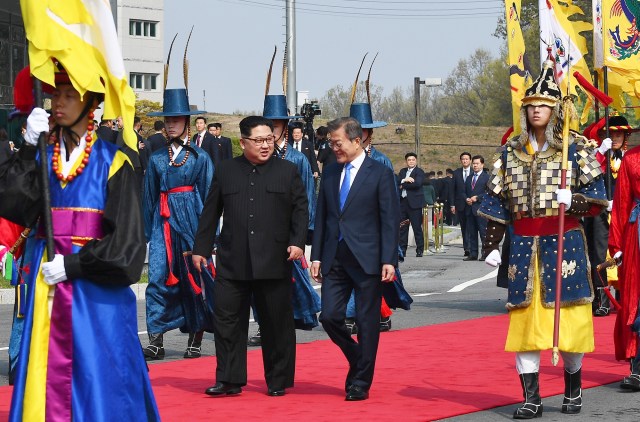Kim Jong-un meets Moon Jae-in. Credit: PA

When Rocket Man landed on Moon, the world held its breath – and then watched with amazement. The North Korean leader who had taken us to the brink of war just a few months ago, was subsequently delivering an unprecedented and historic message of peace and reconciliation for the Korean peninsula.
What to make of it?
There are two extremes to avoid. On the one hand, there’s temptation to dismiss this as a stunt, a cynical public relations exercise, a manipulation by a regime that cannot be trusted. It’s tempting to do so, given the North Korean regime’s history of histrionics, followed by charm offensives, followed by broken promises. On the other hand, there’s the impulse to embrace it and to think it is a Gorbachev/Thatcher/Reagan moment, or an FW de Klerk/Mandela one. Both instincts would be wrong.
When it comes to the North Korean regime, I am a cynic. I have met too many escapees from the North Korean gulags, heard too many testimonies, read too many human rights reports and books, seen too many scars on the bodies of survivors to think that this is a regime that could be trusted. And that is my problem with what is going on – the atrocities committed by Kim Jong-Un and his father and grandfather are being conveniently swept under the carpet. They must not be.
The United Nations Commission of Inquiry has claimed that “the gravity, scale and nature” of the appalling human rights violations by North Korea’s regime “reveal a State that does not have any parallel in the contemporary world”. It has recommended that Kim Jong-Un’s crimes against humanity be called to account at the International Criminal Court.
Yet clearly, if an olive-branch is offered, however insincerely, it would be foolish to turn it away after 65 years of a state of war. President Moon Jae-in knows that. And he played his hand with dexterity. His footsy with Kim Jong-Un over the borderline was bizarrely charming. And the promise of people-to-people links and a peace treaty, an end to war and denuclearisation are hard to argue with.
For his next move, he should brush up on Ronald Reagan’s Berlin Wall speech. Speaking to the people of Berlin, Reagan said that American presidents come “because it’s our duty to speak, in this place, of freedom”. That message should never be lost in Seoul, Pyongyang, or Panmunjom. “Behind me stands a wall that encircles the free sectors of this city, part of a vast system of barriers that divides,” the President continued. He spoke of “a gash of barbed wire, concrete, dog runs and guard towers” that could perfectly describe North Korea today.
As President von Weizsacker said, as long as such a divide remains, it affects “the question of freedom for all mankind”. That is why a resolution to the Korean question – as was the case with the German divide 31 years ago – revolves not so much around denuclearisation as around human dignity and freedom. It would be no good to give Mr Kim the impression that he can keep his prison camps if he gives up his nuclear weapons.
For as President Reagan said three decades ago:
“There stands before the entire world one great and inescapable conclusion: freedom leads to prosperity. Freedom replaces the ancient hatreds … Freedom is the victor … Freedom and security go together, that the advance of human liberty can only strengthen the cause of world peace.”
The message now to Mr Kim should be this: “Kim Jong-Un, if you seek peace, if you seek prosperity for the Korean peninsula, if you seek liberalisation: Come to the prison camps! Mr Kim, open the gates to the gulags! Mr Kim, tear down the walls of the gulags! Mr Kim, free all your political prisoners.”
Hearts have been hardened over six decades of war and oppression and separation, but here is an opportunity. It is clear that the North Koreans are interested in change, as a recent report by Christian Solidarity Worldwide concludes. The spread of information from outside into the ‘hermit nation’ has increased, has made a difference and should be increased.
Yet we must not be naïve either. For as long as anyone in North Korea is jailed, tortured or executed for holding a belief – political or religious – that differs from Kim Jong-Un’s, there cannot be peace on the Korean peninsula. Once he takes clear steps towards freedom of expression, freedom of the press, freedom of religion or belief, an end to the gulags, then we will know he means business. Until then, one can only conclude that the soundbites were good, the images were inspiring, but where is the substance? Only time will tell.










Join the discussion
Join like minded readers that support our journalism by becoming a paid subscriber
To join the discussion in the comments, become a paid subscriber.
Join like minded readers that support our journalism, read unlimited articles and enjoy other subscriber-only benefits.
Subscribe